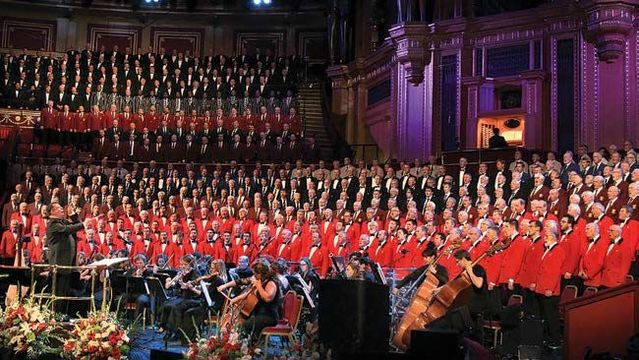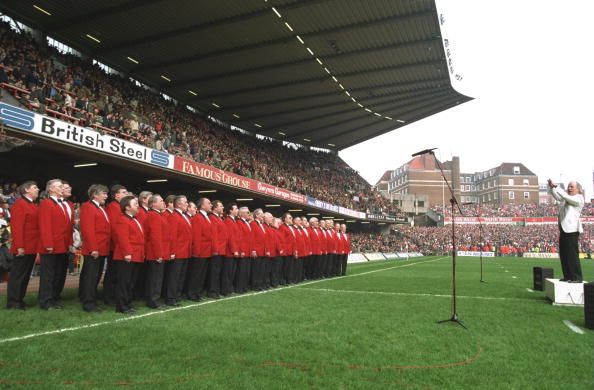
Welsh male voice choir in action. Getty
Welsh male voice choirs are regarded around the world as the best of their kind with good reason.
One evening in a school hall just a few minutes away from the great medieval fortress of Chepstow Castle, I shared a little bit of magic. A week later I repeated the experience in Monmouth’s Shire Hall, this time beneath the painted gaze of King Henry V—a native of the south Wales town—portrayed triumphant at the Battle of Agincourt 1415.
Take a bunch of cheerful, bantering chaps. Call for silence and ask them to stand. Then the most glorious swell of sound fills the hall. It could be a rousing rendition of “Cwm Rhondda” (Bread of Heaven), the dramatic crescendos of “Calon Lân” (A Pure Heart), or a medley of Tom Jones’ hits. Wales has long been known as the Land of Song and its male voice choirs are an iconic part of the tradition.
The history
In my neck of the woods, choirs like Tredegar Orpheus and Caerphilly trace their roots back more than a century; those at Chepstow and Monmouth, whose rehearsals I attended, are more recent. Choirs like the Pendyrus and Treorchy are known worldwide. Exact figures are difficult to pin down, but there are probably in the region of 100 male choirs across Wales today, and many welcome visitors free of charge to their weekly or even twice-weekly practices. It’s certainly an interesting way to pass an evening, to soak up some culture and meet a few locals.
So where does this national love of song come from? (You can equally experience it among crowds at a rugby match or occasionally in pubs when full harmony choruses spontaneously break out.) Just as important, where is it going?
As early as the 12th century, the wandering clergyman Giraldus Cambrensis (Gerald of Wales) noted the Welsh love of music and gift for singing in harmony, “melding in the soft sweetness of B-flat.” But in truth, the modern phenomenon of male voice choirs was stirred from the cauldron of the 18th/19th-century religious and industrial revolution. Methodism and chapel going, mining, danger, discipline, poverty, and patriotism all played their part in rooting male choirs into the heart of communities.
The nonconformist revival of the 18th/19th centuries, particularly strong in Wales, was a “people’s religion” with its emphasis on harmonized congregational singing and participatory fervor whipped up by pulpit orators. Aided by the embrace of tonic sol-fa, this was not simply music and singing, but Welsh music and singing that fired a renewed sense of identity. Some 80 percent of people in Wales were chapel-goers in the latter 19th century.
Add the boom in coal mining, iron and slate, and the seething concentrations of populations that grew around pit and quarry, the perils men faced and the comradeship that saw them through—you begin to understand how choirs, demanding committed shoulder-to-shoulder teamwork as well as providing emotional release, became so firmly planted in industrial areas. What else can explain how macho, work-hardened men could get together, stand in public and bare their souls so movingly in song?
Choirs sprang up like wildfire, some of them 150 voices strong. And with them came the opportunity to travel and tour, and the tribal desire to compete—a spirit still to be witnessed today at the annual National Eisteddfod and smaller eisteddfodau, though times do change: Prizes no longer include a pair of boots and a pair of trousers, as they did for winning conductors in a competition held in Tonypandy in 1899. Nor are there competition categories for choirs of the unemployed, as at the 1938 Cardiff National (there were five entries). Choirs had boomed not only when industry did, but when mass unemployment and hardship hit in the 1920s and 1930s; choirs occupied men’s unoccupied time, gave a lifeline through some sense of purpose and pride, and they could help to raise much-needed money through performances.
The Pendyrus Male Voice Choir in the Rhondda Valley was formed in 1924 when out-of-work miners from the south Wales coalfield decided to take advantage of their enforced leisure time. Today it is among the most traveled choirs (it even has a street named after it in Delta, Pennsylvania). Choir member and social historian Gareth Williams notes in his book Do You Hear the People Sing? some of the claims made for different sounds associated with different areas of Wales: That coal produced the ringing top tenors of south Wales; slate the thunderous basses of the north; the poured molten metal of tin and copper works around Swansea contributed to the mellow tones of choirs like the Morriston, while iron-making townships such as Tredegar “found powerful comfort in the comradeship of song.”
A national characteristic
Every choir has its own sound, but there is also merit in talking of a national characteristic. It’s said the Welsh way of talking and singing produces purer vowels. There’s a lilting musicality inherent in Welsh conversation. And then there’s the famous hwyl and hiraeth (any translation falls short of the depth of fervent humor, energy, and longing contained in those words).
So much for the emotional charge of social, industrial, and cultural circumstance that nurtured Wales’ male voice choirs. Nowadays, with mining vanished and chapel-going a minority interest, and with so many more distractions to fill spare time, recruitment of younger men can be a challenge.
I caught up with the Caerphilly Male Voice Choir (British Heritage Travel last visited in 2006 for the choir’s centenary). Top tenor John Morgan reports current membership numbers in the 30s and encouraging news of five new choristers recruited in 2017, although senior choristers, “the troopers,” remain the backbone; one or two have been members for more than 50 years. Camaraderie is in full evidence and, Morgan says, “It’s credit to the choristers, who give their time freely, that we regularly make thousands of pounds for local charities.”

Welsh Choir
Chepstow Male Voice Choir
Dropping into rehearsals with Chepstow Male Voice Choir, just up from Chepstow Castle, I was given a welcoming treat with a superb medley from the choir’s repertoire: the bittersweet love song “Myfanwy,” Tom Jones classics, “Unchained Melody” and “Wonderful World.” These days, choirs offer a broad range of music, adding to traditional Welsh hymns and songs opera choruses and popular hits from the shows.
Chepstow was formed in 1988, renewing the presence of male choral singing in the town that had lapsed during World War II, and members currently number around 40. “The two essential requirements for being in the choir are,” said Dr. Naylor Firth, a founding member and top tenor, “the ability to sing the same note as your neighbor and to have a sense of humor.”
Naylor and fellow choristers Alf Giaquinto and Elvin Hart (both baritones) chatted to me enthusiastically about the choir’s impressive fundraising for charities and singing at weddings, funerals, and concerts. Financing activities is always a challenge, but the pleasure taken and given through entertaining shines through. With choir rehearsals twice a week, friendship and commitment become the glue, and, of course, there’s the afterglow that so many choirs speak of—the more informal, spontaneous singing in pubs or bars following concerts. Over the years their choir tours have included the USA, and, Firth said, “We will be very pleased to entertain groups from the USA who want to come and sit in on our practices. Visitors do make us change gear a bit!”

Chepstow Male Voice Choir
Meanwhile, Monmouth Male Voice Choir was rehearsing “Tell My Father” from The Civil War musical when I visited them in the town’s Shire Hall, a song that made an interesting counterpoint to King Henry V in full battledress in the picture towering over them from the hall’s wall.
Founded in 2012, the choir rather bucks the general trend elsewhere in Wales by being both young in history and a tad more youthful in the age range of its 40 or 50 members. Chairman and baritone Huw Edwards told me how he and “a small group of mates who used to go to pubs, watch rugby and do some singing afterward” decided to form a choir. Before they knew it, they were serious and so were others who joined them. Their motto today sums it up: “The pursuit of excellence through diligence, practice, good humor, and the occasional pint.”
“Music gets to people’s soul,” Edwards says. “It allows people to do things they would never have dreamt they would do.” The choir has sung at London’s Royal Albert Hall as well as in front of 70,000 rugby fans at Cardiff’s Principality Stadium before Wales beat Scotland in 2016. The choir is hoping to make its first overseas tour, and Edwards says, “We are open to offers from North America!”
Wales’ male voice choirs: The music is wonderful, but it’s about so much more than that, too.





Comments